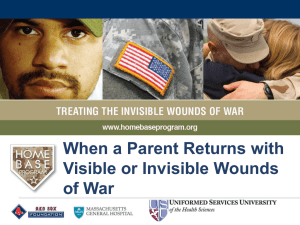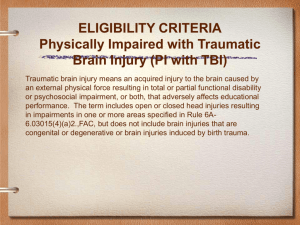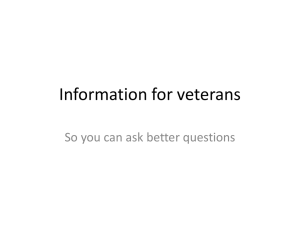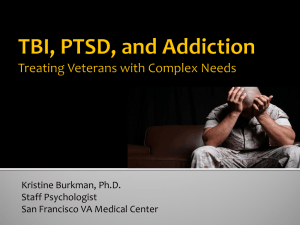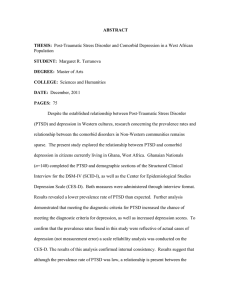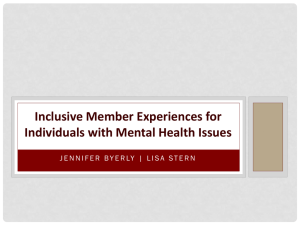Post-Deployment Stress: What You Should Know, What You Can Do
advertisement
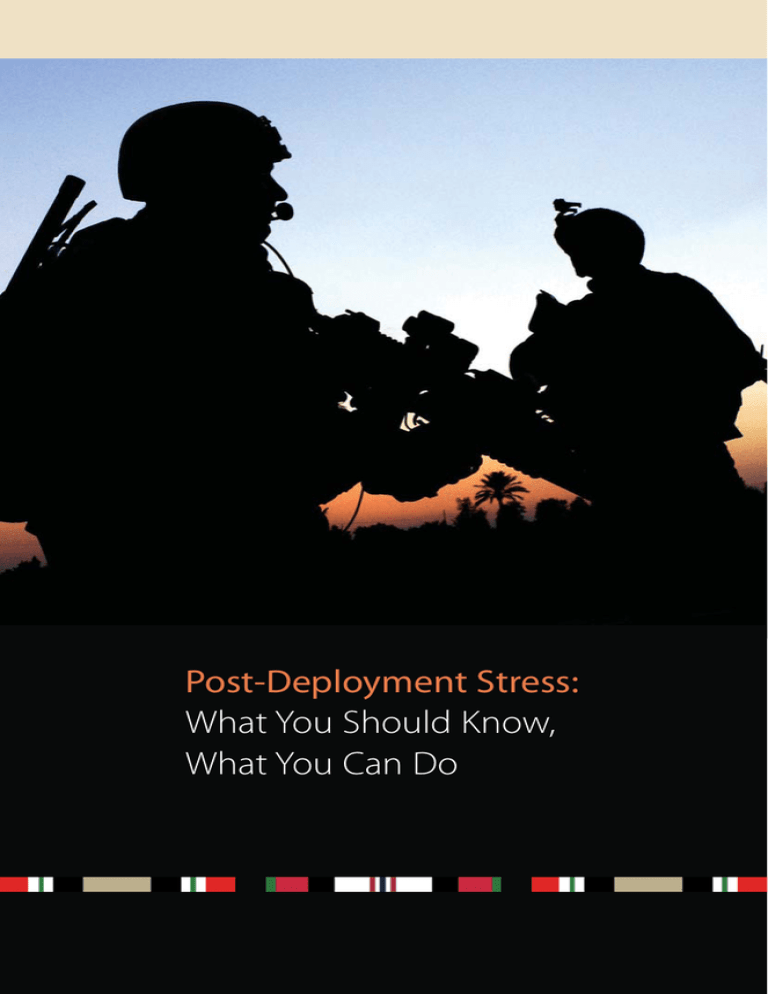
Post-Deployment Stress: What You Should Know, What You Can Do 2 Almost everyone who has spent time in Iraq or Afghanistan has experienced something very stressful. Studies of military personnel deployed to these areas find that traumatic experiences—such as being attacked or ambushed, having to handle or uncover human remains, and knowing someone who was seriously injured or killed—are common. If you had similar experiences when you were in Iraq or Afghanistan, you are not alone. E veryone reacts differently to this kind of stress. But many returning military members have thoughts, feelings, and behaviors like these: Thoughts, you might: Be forgetful and have trouble concentrating Relive bad memories of traumatic events Have thoughts of death or suicide Feelings, you might feel: Sad Hopeless Worthless Paranoid Anxious Guilty Angry Behaviors, you might: Avoid situations that trigger flashbacks of your traumatic experiences Not want to socialize Have low energy Use drugs or drink too much 3 Photo Courtesy of U.S. Army You may have these same kinds of thoughts and feelings. It’s important for you to know that these are normal reactions to abnormal events and that many military personnel have felt the same way. combination of these. Fortunately, there are lots of ways to get support if you need it. This booklet contains information you can use now or later to help you understand and cope with the problems you face. However, these thoughts, feelings, and behaviors can also mean that you have more serious problems, including posttraumatic stress disorder (PTSD), traumatic brain injury (TBI), depression, or a RESOURCES Military OneSource 1-800-342-9647 https://www.militaryonesource.com Department of Defense (DoD) PTSD and TBI Quick Facts http://www.pdhealth.mil/downloads/TBI_PTSD_Final04232007.pdf National Alliance on Mental Illness (NAMI) 1-800-950-NAMI http://www.nami.org/veterans 4 What Is Post-Traumatic Stress Disorder (PTSD)? Photo Courtesy of Kayla Williams Kelly, a member of the Army National Guard, was deployed in Afghanistan for a year and has just returned home. Since her return, she has been having trouble sleeping, is angry all the time, avoids talking about her war experiences, and has nightmares about them, including seeing a friend die in a car bombing. These problems are making it hard for her to do her work as a loan officer for a mortgage company. Kelly is having symptoms like those caused by post-traumatic stress disorder (PTSD), a condition that people have after experiencing a disturbing event. Combat experiences—such as being shot at, handling dead bodies, or knowing someone who was killed—can trigger PTSD. 5 Symptoms of PTSD can include: Reliving the event. You feel that you are experiencing the event again—often with the same fear and shock you had when it took place. These kinds of flashbacks can be triggered by loud noises, seeing a traffic accident, or even watching a news report. Feeling numb. It seems like you don’t have any feelings, and you may lose interest in relationships and activities. Feeling on edge. You get angry or annoyed very easily and you have a hard time sleeping, or you may overreact when something startles you. Avoiding situations that remind you of the event. You try to avoid places or experiences that bring back memories of your terrible experience. If you have such symptoms and they are affecting your activities at home or duties at your job, it may help for you to talk to someone at your local doctor’s office or clinic. You can also call Military OneSource for confidential information about getting help: 1-800-342-9647 RESOURCES The Veterans Affairs (VA) National Center for PTSD http://www.ncptsd.va.gov/ncmain/ncdocs/manuals/GuideforMilitary.pdf http://www.ncptsd.va.gov/ncmain/ncdocs/videos/emv_newwarr_vets.html Army http://chppm-www.apgea.army.mil/deployment/Guides/RedeploymentTriFold/Deployment_Related_Stress.pdf Marines http://www.usmc-mccs.org/cosc/63619-usmc.pdf American Psychiatric Association http://www.healthyminds.org/multimedia/ptsd.pdf 6 What Is Traumatic Brain Injury (TBI)? Jason is a private first class in the Marine Corps who was deployed to Iraq for eight months, where he was exposed to an improvised explosive device (IED) blast. None of the IED’s parts hit Jason, but he has frequent headaches that get worse every day, has trouble with his coordination, and gets easily confused. Jason is frustrated because he can’t help his two sons with their homework and has started to drink a lot every night. Jason’s feelings and behavior could mean that he has traumatic brain injury (TBI). TBI can be caused when something hits a person’s head very hard or when something goes through the skull and enters the brain. Even the blast waves alone from an IED can cause TBI. If you had a blow or shock to your head and you have one or more of these symptoms, you could be suffering from the long-term consequences of TBI. If the symptoms persist, it may help for you to talk to someone at your local doctor’s office or clinic. You can also call Military OneSource for confidential information about getting help: 1-800-342-9647 RESOURCES Defense and Veterans Brain Injury Center 1-800-870-9244 http://www.dvbic.org/ National Center for Injury Prevention and Control information on TBI http://www.cdc.gov/ncipc/tbi/tbibook.pdf Department of Veterans Affairs http://www.va.gov/environagents/docs/TBI-handout-patients.pdf 7 Photo Courtesy of U.S. Marine Corps Traumatic brain injury can cause problems long after the injury actually happens. Symptoms can include: Constant headaches Confusion Light headedness or dizziness Changes in mood or behavior Trouble remembering or concentrating Repeated nausea or vomiting Problems with seeing or hearing. 8 What Is Depression? Photo Courtesy of U.S. Department of Defense Antonio is a sergeant in the Army and has just returned from a 15-month deployment in Iraq. He is excited to be home especially since he has a one-yearold daughter who was born while he was in Iraq. But he often feels depressed and sad, and he doesn’t have much interest in playing with his new daughter or threeyear-old son. His wife is worried because he doesn’t want to be with other people. Antonio has many of the common symptoms of depression. Depression can interfere with your ability to work, sleep, eat, interact with others, and enjoy doing things that you used to like. Depression can also have long-term chronic effects that make it hard for you to function and keep you from feeling good. 9 Here are some of the most common signs of depression: Feeling hopeless, sad, or “empty” most of the time Losing interest or pleasure in activities that you used to enjoy Lacking energy or feeling very tired Thinking about death or suicide Having ongoing physical problems— such as headaches, stomach problems, and pain—that don’t get better even when they have been treated. If you have these kinds of symptoms and they are affecting your activities at home or duties at work, it may help for you to talk to someone at your local doctor’s office or clinic. You can also call Military OneSource for confidential information about getting help: 1-800-342-9647 RESOURCES Department of Defense https://www.qmo.amedd.army.mil/depress/Web%20Depression%20Brochure.doc Uniformed Services University of the Health Sciences depression fact sheet http://www.usuhs.mil/psy/CourageToCarePatientFamilyDepressionFactSheet.pdf National Institute of Mental Health information on depression http://www.nimh.nih.gov/health/publications/depression/nimhdepression.pdf Families for Depression Awareness http://familyaware.org/admk/wellnessguide.pdf 10 Combined Problems Being part of or seeing shocking events can cause PTSD, TBI, or depression, so it is possible to have more than one of these problems at the same time. Be sure to describe all of the symptoms you are having to someone at your local doctor’s office or clinic, or call Military OneSource (1-800-342-9647). Treatment for combined problems may be different from treatment for just one of them. If you think you have an alcohol or drug problem, you should see your health care provider for help. SUBSTANCE USE AND ABUSE PTSD, TBI, or depression can affect many parts of your life. Like Jason, you may find yourself drinking or using drugs to deal with your problems. This might help you escape for a little while, but alcohol or drugs can actually make your problems worse. You have many ways to get help—some of them listed in this booklet. There are also some simple things that you can do immediately. It’s often hard to know when alcohol or drug use is becoming a problem. Here are some signs to look for: You feel guilty about your alcohol or drug use Your family and friends comment on how much you are drinking Your drinking or drug use makes it hard to live up to your responsibilities at home or at work You need more alcohol or drugs to get the same effect You have tried to cut down on your use but can’t. HELPING YOURSELF MAKE THE TRANSITION The transition from deployment to home is hard for everyone, and many other military personnel are having problems like the ones described above. USE THE RESOURCES AVAILABLE TO YOU The military is committed to supporting the health, well-being, and job performance of military personnel. Use the many organizations whose goal is to help you make a smooth transition from deployment to home. They can suggest ways to cope with symptoms of PTSD, TBI, and depression and to get you back on track faster. TAKE CARE OF YOURSELF Exercise and eat well (stay away from junk food). Get enough sleep by keeping a regular sleep schedule and avoiding vigorous exercise before bed. Stay away from alcohol, tobacco, and caffeine. RESOURCES Substance Abuse and Mental Health Services Administration 1-800-662-HELP http://getfit.samhsa.gov/Drugs/ http://getfit.samhsa.gov/Alcohol/ Photo Courtesy of U.S. Army 11 Manage your anger by walking away from situations that make you angry or by talking things over with people who have made you angry. If you are feeling depressed and are thinking about hurting yourself, ask for help from a family member or health care provider or call the National Suicide Prevention Lifeline (1-800-273-TALK). If you need immediate help, call 911. Think about the things you like to do, and do them. Set realistic goals and don’t take on more than you can handle. If you find it hard to tackle large problems, break them into smaller ones. Then start with the small tasks that are most important. If you have experienced brain trauma, it is important to avoid vigorous physical activities that would lead to further injury and to avoid alcohol, caffeine, pseudoephedrine (Sudafed), and heavy use of sleep aids that can put more stress on your brain. If you are having memory problems, carry a notebook or set a regular routine for what you do. PAY ATTENTION TO YOUR FEELINGS If you have a flashback or nightmare, remind yourself of where you are and that you are safe. Possibly get up, move around, and talk to someone. Tell your doctor or someone close to you about it. TALK WITH OTHERS If you are having any of the problems described in this booklet, it’s important for you to discuss them with other people and to think about getting help. Health Care Providers. You can talk in private with a health care provider, such as a doctor, nurse, psychologist, or other mental health professional. They know how to treat common post-deployment problems related to PTSD, TBI, and depression. Make an appointment specifically to discuss your symptoms. To help a health care provider understand and treat your symptoms, take a list of questions and concerns with you to your appointment. As you go through the list together, take notes so that you can remember the provider’s advice. It can also be useful to take someone you trust with you to this appointment to help you remember important parts of the discussion. 12 Don’t feel like you’ve got only one chance to ask a health care provider for help. After your first appointment, set up another appointment so that you and the provider can follow up on your progress. If you decide to meet with a mental health professional, you may meet on a regular basis (likely once a week) until your symptoms improve. Your Family. Your spouse or significant other and other family members can provide important support. You may not want to talk with them about your problems because you’re worried that you will be a burden. But often the best thing you can do for your family is to talk openly about your thoughts, feelings, and actions. You can work together to move forward. You may talk to your loved ones about practical issues, such as scheduling appointments or how to keep track of your symptoms, but you can also talk to them about other concerns related to PTSD, TBI, or depression. It may be helpful to set aside a time every day to check in with the people you care about, for example, in the morning before your day begins or before going to sleep at night. Children. Children are usually comfortable with routines, so they may have a hard time with the changes that occur when you come home and notice that you are acting differently. Depending on their age, they may have questions and concerns. It is often more scary for children when they feel kept in the dark, so if your child asks about your symptoms, you can explain some of how you’re feeling in a way that they will understand. 13 Church or Religious Leaders. Some people feel that religious leaders or elders can offer helpful advice. Set up a time with a church or religious leader whom you trust to discuss your symptoms, and use their advice to complement the help you are getting from health care providers and family. Other Veterans. It can be helpful to connect with people who have served with you or who have had similar experiences. Your local VA may have a network you can use to contact other service members, or you can connect with others online at the Veteran Recovery Web site through the U.S. Department of Veterans Affairs. Children need to know that it’s okay to ask questions. As with other family members, think about scheduling a regular time with your children to check in. Reassure them that someone will always be available to take care of them while you get the help you need. RESOURCES Military OneSource 1-800-342-9647 https://www.militaryonesource.com Department of Veterans Affairs, Veteran Recovery http://www.veteranrecovery.med.va.gov/ BE PATIENT WITH YOURSELF Don’t expect improvement overnight. You are more likely to feel a little better every day. It may help to increase activity slowly. 14 Treatment Most people who are in treatment get better. Treatment can improve your life in many ways. It can lead to better physical health and job performance. It can also improve your family relationships. There are many ways to treat the symptoms you are having and to make you feel more like yourself. The kind of treatment and how long you’ll receive it will differ for every individual, but the sooner you take action to deal with postdeployment stress, the sooner you will be able to feel better and move on with your life. Learning About Symptoms. Symptoms related to PTSD, TBI, and depression are common, but not everyone experiences post-deployment stress in the same way. Use this booklet and the resources listed here to learn how to recognize symptoms that can be treated by a health care provider. Learning About Treatment. If you have identified thoughts, feelings, and behaviors that are part of postdeployment stress, you might want to learn more about how to get help. Your health care provider will tailor treatment to meet your needs. For example, treatment might involve discussions with a health care provider in person, medications, or both. This booklet and the resources listed in it give you more information about available treatments. Getting Treatment. If you have concerns about getting care for a personal or emotional problem, you can talk to someone at Military OneSource (1-800-342-9647) or at a Veteran’s Center. Call 1-800-905-4675 (Eastern) or 1-866-496-8838 (Pacific) to get contact information for the Veteran’s Center nearest you. Your call will be confidential and will not be shared with military authorities. RESOURCES Military OneSource: Confidential information, support, and counseling available free to military personnel (regardless of activation status) and their families 1-800-342-9647 https://www.militaryonesource.com Vet Centers: Confidential readjustment counseling for combat veterans and their families 1-800-905-4675 (Eastern) or 1-866-496-8838 (Pacific) http://www.vetcenter.va.gov/ To get more copies of these and other materials, and to find links to more than 20 helpful resources http://veterans.rand.org 15 If you want to get care, your entry to the medical system may depend on your current military status: If you are on active duty, you can go directly to your unit’s military medical provider. You can contact a mental health provider through your normal TRICARE channels. You can specify either a civilian or military provider, though there may be wait times for the next available appointment. If you served in a theater of combat operations after November 11, 1998 and have since left the military, you may be eligible to receive care for up to five years following discharge at a local VA medical treatment center. You can call 1-877-222-8387 or go to http://www.va.gov/directory for more assistance. If it has been more than five years since you left the service, then you may still be eligible for care at the VA. If you are a Reservist or in the National Guard, contact your unit or a unit near you to find out about local resources. You can find out about treatment options at your local VA medical treatment center (call 1-877-222-8387 or go to http://www.va.gov/directory). You can also contact Military OneSource (1-800-342-9647) to learn about benefits you may be eligible for through TRICARE Reserve. Finally, if you are using your civilian health insurance, contact your insurer to get more information about mental health care covered by your plan. RAND is a nonprofit institution that helps improve policy and decisionmaking through research and analysis. Note: Persons shown in the images throughout this booklet are for illustrative purposes only and are not associated with any of the psychological and cognitive problems presented. CP-534 (3/08) Cover Photo Courtesy of U.S. Department of Defense

